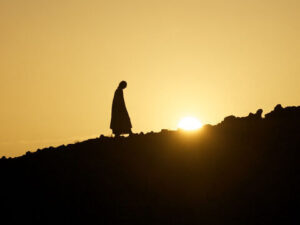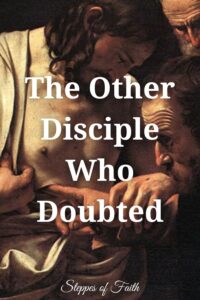
“And blessed is he who does not stumble because of Me.” (Luke 7:23)
Many Bible readers are familiar with the story of Jesus appearing to the twelve disciples after His resurrection. Despite the miracle, one remained skeptical-Thomas. In John 20, the other disciples (minus Judas) had already seen the risen Savior and reported it to Thomas, but he refused to believe.
“The other disciples, therefore, said to [Thomas], ‘We have seen the Lord.’ So he said to them, ‘Unless I see in His hands the print of the nails and put my finger into the print of the nails and put my hand into his side, I will not believe.’” (Jn 20:25)
Thomas’ disbelief famously earned him the unfortunate moniker “Doubting Thomas.” But another person in the Bible struggled with doubt just as much.
Equally famously, John the Baptist is known for being “the voice of one crying in the wilderness” and making “straight the way of the LORD (Is 40:3; Jn 1:23).” He was not God’s voice, as Deuteronomy 18:15-18 foretold (that was Jesus), but he did apply the idea to himself as the Messiah’s forerunner. Part of that job included preaching repentance and baptizing potentially hundreds of people.
Prior to that, John had leaped in his mother’s womb when Mary, Elizabeth’s cousin, came for a visit while divinely pregnant with the Messiah Jesus (Lk 1:41). He also saw the heavens open, the Holy Spirit descend like a dove, and hear the voice of the Father at Jesus’ baptism, announcing, “This is My beloved Son in whom I am well pleased (Mt 3:16-17).”
He also openly proclaimed when he first saw Jesus, “Behold! The Lamb of God who takes away the sin of the world! This is He of whom I said, ‘After me comes a Man who is preferred before me (Jn 1:29-30).’”
Given these events, one would conclude that John had unshakable faith. But like many of us, even he struggled with doubt.
Confusion and Questions
Later in his life, as he sat in Herod’s prison, John began to doubt whether Jesus was the true Messiah, not that the Messiah did not exist but rather if He was “the one.” He did not have a crisis of faith, but he had questions. Some might say he did not truly doubt, but Scripture shows that he did at least somewhat.
Up to this point, John had felt sure that Jesus was the Messiah. He based his entire ministry on it. In Matthew 3, his confidence caused him to widely preach about the coming judgment and how the Messiah would “burn up the chaff with unquenchable fire (Mt 3:12).” But now, a recent turn of events made him doubt.
- The religious leaders rejected Jesus and were hostile toward Him.
- Jesus performed miracles but did not bring judgment, as John foretold.
- Jesus was performing miracles mainly in Galilee, not Jerusalem, the hub of the Jewish faith.
- He, the Messiah’s forerunner, was in prison for exposing Herod’s son’s sin, yet Jesus was eating and drinking with sinners.
It seemed, in every way, that Jesus was doing the opposite of what John preached. Perhaps he had feelings of failure, but it appears doubt overtook him. He needed reassurance, so he sent two of his disciples to Jesus to ask Him the one question people all over the world continue to ask today.
“Are You the Coming One, or do we look for another?” (Lk 7:19)

Jesus Eases John’s Doubt
John’s question is slightly ironic since he, too, was not what the people expected as the Lord’s prophet. Jesus indicates in Matthew 11:7-8 and Luke 7:24-25 that they likely expected someone more like some of the religious leaders.
“What did you go out into the wilderness to see? A reed shaken by the wind? But what did you go out to see? A man clothed in soft garments? Indeed, those who are gorgeously appareled and live in luxury are in kings’ courts.”
The people expected someone proud and well-dressed but often bent to the beliefs of their audience (rabbis often described such people as “reeds”). But John wore camel hair, ate locusts, had a firm conviction of faith, and absolutely would not be found in such religious circles (reeds grow in marshes and not the wilderness).
Despite all that, John had questions, so he sent two of his disciples to Jesus.
Luke 7 records that Jesus did not immediately answer them as a crowd gathered around Him. Instead, He continued performing many miracles “at that very hour” in the disciples’ presence. He then turned to the disciples, saying,
“Go and tell John the things you have seen and heard: that the blind see, the lame walk, the lepers are cleansed, the deaf hear, the dead are raised, the poor have the gospel preached to them.” (Lk 7:22)
Jesus Quotes Prophecy
In His reply, Jesus spoke from Isaiah 35:5-6, which gave prophetic promises concerning the Messiah. Some argue that He also meant to refer to Isaiah 61:1 but refrained from doing so.
“He has sent Me to heal the brokenhearted, to proclaim liberty to the captives, and the opening of the prison to those who are bound.”
The theory is that Jesus purposely omitted mentioning setting any captives free from prison because He knew John was in Herod’s prison. Scripture does not necessarily support this view. However, it does speak of the people’s expectation that the promised Messiah would overthrow the Roman government and set Israel free. Jesus did not do that, which only added to John’s doubt.
Still, in referring to Isaiah 35, Jesus declared that He was doing all the Scriptures had foretold about Him even though it did not seem to be unfolding the way John might have imagined.

Encouragement for Our Doubts
Jesus went to say in Luke 7:23, “And blessed is he who is not offended because of Me.”
Here, Jesus gives a new Beatitude: “Blessed is he (see also Mt 5:3-10).” The Greek word for “blessed” (makarios) means supremely happy, fortunate, or blissful—feelings of joy that belong only to the faithful regardless of circumstances.
The word “offense” in Greek (skandalizo) does not indicate a rebuke or a posture that one should be defensive. It is better translated as “stumble.” Taken together, Luke 7:23 correctly says, “Happy is he who does not stumble because of Me.”
Jesus offers John great encouragement and a reminder that one should not be upset with how God conducts His affairs. God Himself tells us in His word, something John surely knew,
“‘For My thoughts are not your thoughts, nor are your ways My ways,’ says the LORD.” (Is 55:8)
Everything John’s disciples saw that hour proved that Jesus was the “Coming One,” and He was doing everything that the Father expected of Him. The fact that John was in prison was an unfortunate coincidence and was not an indication of any diminishment of God’s power in any way. Therefore, Jesus felt compassion for John and graciously offered the reassurance he needed. He even turned to the crowd to use John as an example of those whose expectations of God are not met and offered praise for his character (Lk 7:24:28).
In gratitude for John, Jesus demonstrated His power to John’s disciples to prove that He is the Messiah. He knew that, though he doubted, John’s faith was strong, and the disciples’ report would be enough. All John needed was reassurance and confidence in what he already believed.
Thomas doubted Jesus’ resurrection, and John doubted Jesus’ identity. Many people today struggle in the same way. When we face circumstances in which it does not seem like God is near, some might doubt that He is who He claims to be.
Thankfully, we have abundant assurance through His declared word and the Holy Spirit that Jesus is the promised “Coming One,” the Messiah, who took away the sin of the world by shedding His blood on the cross. He then rose again to sit on the throne of heaven in full authority and indeed set the captive free.
